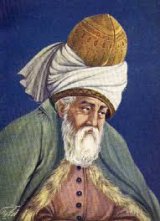Story XI. The Lion who Hunted with the Wolf and the Fox
Jalal al-Din Rumi 1207 (Balkh ) – 1273 (Konya )
A lion took a wolf and a fox with him on a hunting excursion, and succeeded in catching a wild ox, an ibex, and a hare. He then directed the wolf to divide the prey. The wolf proposed to award the ox to the lion, the ibex to himself, and the hare to the fox. The lion was enraged with the wolf because he had presumed to talk of "I" and "Thou" and "My share" and "Thy share," when it all belonged of right to the lion, and he slew the wolf with one blow of his paw. Then, turning to the fox, he ordered him to make the division. The fox, rendered wary by the fate of the wolf, replied that the whole should be the portion of the lion. The lion, pleased with his self-abnegation, gave it all up to him, saying, "Thou art no longer a fox, but myself."
"Till man destroys 'self' he is no true friend of God."
Once a man came and knocked at the door of his friend.
His friend said, "Who art thou, O faithful one?"
He said, "'Tis I." He answered, "There is no admittance.
There is no room for the 'raw' at my well-cooked feast.
Naught but fire of separation and absence
Can cook the raw one and free him from hypocrisy!
Since thy 'self' has not yet left thee,
Thou must be burned in fiery flames."
The poor man went away, and for one whole year
Journeyed burning with grief for his friend's absence.
His heart burned till it was cooked; then he went again
And drew near to the house of his friend.
He knocked at the door in fear and trepidation
Lest some careless word might fall from his lips.
His friend shouted, "Who is that at the door?"
He answered, "'Tis Thou who art at the door, O Beloved!"
The friend said, "Since 'tis I, let me come in,
There is not room for two 'I's in one house."
Font size:
Submitted by naama on July 15, 2020
Modified on April 24, 2023
- 1:46 min read
- 113 Views
Quick analysis:
| Scheme | X XABCXCDDXXCXABXXXXX |
|---|---|
| Characters | 1,788 |
| Words | 354 |
| Stanzas | 2 |
| Stanza Lengths | 1, 19 |
Translation
Find a translation for this poem in other languages:
Select another language:
- - Select -
- 简体中文 (Chinese - Simplified)
- 繁體中文 (Chinese - Traditional)
- Español (Spanish)
- Esperanto (Esperanto)
- 日本語 (Japanese)
- Português (Portuguese)
- Deutsch (German)
- العربية (Arabic)
- Français (French)
- Русский (Russian)
- ಕನ್ನಡ (Kannada)
- 한국어 (Korean)
- עברית (Hebrew)
- Gaeilge (Irish)
- Українська (Ukrainian)
- اردو (Urdu)
- Magyar (Hungarian)
- मानक हिन्दी (Hindi)
- Indonesia (Indonesian)
- Italiano (Italian)
- தமிழ் (Tamil)
- Türkçe (Turkish)
- తెలుగు (Telugu)
- ภาษาไทย (Thai)
- Tiếng Việt (Vietnamese)
- Čeština (Czech)
- Polski (Polish)
- Bahasa Indonesia (Indonesian)
- Românește (Romanian)
- Nederlands (Dutch)
- Ελληνικά (Greek)
- Latinum (Latin)
- Svenska (Swedish)
- Dansk (Danish)
- Suomi (Finnish)
- فارسی (Persian)
- ייִדיש (Yiddish)
- հայերեն (Armenian)
- Norsk (Norwegian)
- English (English)
Citation
Use the citation below to add this poem to your bibliography:
Style:MLAChicagoAPA
"Story XI. The Lion who Hunted with the Wolf and the Fox" Poetry.com. STANDS4 LLC, 2024. Web. 20 Apr. 2024. <https://www.poetry.com/poem/54270/story-xi.-the-lion-who-hunted-with-the-wolf-and-the-fox>.



Discuss the poem Story XI. The Lion who Hunted with the Wolf and the Fox with the community...
Report Comment
We're doing our best to make sure our content is useful, accurate and safe.
If by any chance you spot an inappropriate comment while navigating through our website please use this form to let us know, and we'll take care of it shortly.
Attachment
You need to be logged in to favorite.
Log In